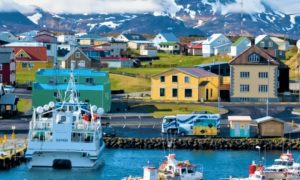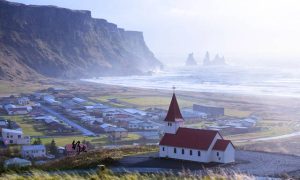in choosingimmigrantsWhen it comes to destinations, more and more Chinese families are turning their attention to the "small Nordic countries" - the "small Nordic countries" of China.IcelandicThis mysterious country with its aurora borealis, volcanoes and blue lakes is not only a natural environment, but also has an education system that has been recognized by the United Nations as one of the best in the world for children. This mysterious country with its aurora borealis, volcanoes and blue lakes not only has a pleasant natural environment, but also has an education and welfare system that has been recognized by the United Nations as one of the world's best countries for children to grow up in.
Well, for those who want toTake the kids with you.Immigration to Icelandas far as families are concernedWhat are the advantages and disadvantages of this country for parents and children? What are the advantages and disadvantages of its education system, child welfare, language environment and future development space? Today, we're going to talk about it all at once!
I. Overview of the Icelandic education system: equity, quality and emphasis on quality
Practiced in Iceland12 years of compulsory education, included:
-
Preschool: 0-6 years of age
-
Kindergarten is based on play and exploration;
-
Non-mandatory, but 95%+ kids attend;
-
Monthly costs vary depending on the region and generally range from 100-250 euros, with subsidies for low-income families.
-
-
Basic education (Compulsory School): 6-16 years of age
-
Includes elementary and middle school for a total of 10 years;
-
Totally free, including textbooks, school buses;
-
Education is oriented toward fostering independent thinking, artistic creativity, and critical thinking;
-
Small class sizes and high student-teacher ratios.
-
-
Upper Secondary: 16-20 years of age
-
There are academic and vocational programs;
-
Free, but some private schools or vocational programs require a small fee;
-
Can be used as a foundation for college or career advancement.
-
-
Higher education (University)
-
There are seven universities in Iceland with low or no tuition fees;
-
International student programs are mostly taught in English.
-
✅ Educational Highlights:
-
Emphasis on children's mental health and creative development;
-
Very little exam stress;
-
Teachers respect individual student differences;
-
Students have a high degree of freedom, but self-discipline is also encouraged.
Second, what are the benefits of parent-child immigration?The 2025 policy focus is here!
Iceland is the world'sOne of the most important countries for family welfareThe program is especially child and childcare friendly. Key benefits include:
1. 👶 Child Benefit
-
All legally resident families are eligible to apply;
-
Up to several thousand euros per year, depending on family income, number of children;
-
No nationality is required, only one year of legal residence.
2. 🤰 Paid maternity/parental leave
-
Total parental entitlement12 months parental leave(6 months for each parent), government subsidized 80% on an income basis;
-
You can choose to take some of the time off at the same time, or stagger your enjoyment;
-
Fathers are encouraged to participate in childcare (unused leave cannot be transferred to another party).
3. 🍼 Free health care and vaccines
-
Children are fully insured and vaccinations are free;
-
Routine pediatric examinations, dental, and vision and hearing examinations are all covered.
4. 🏡 Housing subsidies and support for low-income households
-
Low-income families can applyHousing subsidies and preschool exemptions.;
-
Families with many children receive an additional living allowance.
Third, the biggest concern of Chinese-speaking families: what about language?
This is a major concern for most Chinese parents. Although Icelandic is the official language, it is not difficult to cope with it:

✅ Preschool age
-
Most kindergarten teachers speak English and some offer English adaptation classes;
-
The Government encourages the provision ofrecent immigrantsChildren are provided with language support.
✅ School education
-
Instruction in public schools is mainly in Icelandic;
-
However, children of immigrants are assignedIcelandic Adaptation Course(Free);
-
Most teachers can communicate in English and respect multilingual backgrounds;
-
Children usually adapt to daily communication within 6-12 months.
🌟 Reality: Children under the age of 10 are usually very quick in adapting to language, instead parents need to be more prepared for the language transition.

IV. Future development of the child and university opportunities
Iceland, despite its small population, is highly internationalized and has interoperability with the EU education system, providing children with multiple paths to development:
-
After upper secondary school you can apply for admission to the University of Iceland, and alsoUniversities in other European countries.;
-
The government encourages the direction of STEM, environmental protection, and healthcare;
-
Some colleges work with British, American and Australian colleges and universities for transfer or joint degrees;
-
After immigrating and settling for a certain number of years, you can apply for citizenship, opening the door to an international future for your children.
V. Suitable for bringing up childrenImmigration to Icelandpopulation portrait
Iceland is suitable for the following types of families:
-
✅ I hope that my children will stay away from high-pressure test-based education;
-
✅ Emphasis on family atmosphere and mental health;
-
✅ Willing to live a slow life, concerned about nature and the environment;
-
✅ Don't mind the hustle and bustle of the city, seek tranquility and quality education;
-
✅ Parents have some basic English or are willing to learn Icelandic to adapt to society.
✍️ Summary: Iceland is a hidden gem for parent-child immigrants with excellent education and welfare.
If you want to create a child'sFree, safe and loving environment to grow up inand wanting to have a realEducational equity and social security, then Iceland would be an immigration option that exceeds expectations. While the language and climate are initial challenges, the welfare system, the human touch and the space for children to grow up more than offset these inconveniences.






